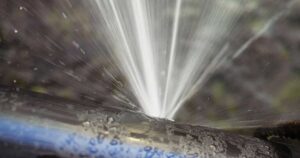The water line is that part of your home’s plumbing that connects the home to the municipal water supply. Although the water line is responsible for providing a constant supply of clean water to your home, it is one of the least-acknowledged parts of your home’s plumbing.
This is because most of the water line is underground, and homeowners only know its presence when it is damaged, explains Limestone Country Properties. The water line, buried in the ground, is mostly out of homeowners’ sight and, therefore, never comes to mind.
But water lines get damaged, and the impact can be devastating when they do. Many things cause water line damage. This post highlights the most common causes of water line damage and the telltale signs that your home’s water line is damaged.
Causes of water line damage
Faulty installation
If they are to last long and work efficiently, water lines must be installed in keeping with city guidelines. If this is not done, the water line will be prone to damage and likely to fail before its projected lifespan. The most common water line installation issues are using substandard materials and hurriedly installing the line. Water lines that are not properly installed are likely to leak.
Soil shifting
If the soil where an underground water line is laid moves, it will displace the line and expose it to the risk of damage. There are several reasons why soil will move. These movements may result from a leak in the water line that needs repair, which leaves the surrounding soil waterlogged. It could also be due to the type of soil and the weather.
Changes in water pressure
Underground water pipes are designed to withstand a certain amount of pressure. If water pressure within the pipes exceeds this upper limit, it will cause cracks and leaks. Significant damage can happen to a water line even if it has been exposed to high water pressure for a very short period. Water pressure issues may also be caused by poor maintenance.
Intruding tree roots
Usually, trees get their water from the surrounding air and soil. But if there is a nearby water line with even the tiniest hairline fracture, tree roots will sniff out the water inside the line and penetrate the pipe to reach that water. Trees’ roots may also interfere with water lines when they displace them from their original position in the ground.
Corrosion
This problem is most common with metal, copper, and steel pipes. PVC and CPVC pipes are also affected by corrosion, but to a lesser extent. In addition to the material of the pipe, other factors that influence the rate of corrosion of a water line are soil acidity and the chemical content of the water running through the pipes.
Extreme temperature changes
Sudden and extreme temperature changes can damage a water line. Water line damage happens in very cold weather when temperatures fall below freezing. If a water line is not below the frost line, it can freeze, causing pressure to build inside the pipe until it bursts. Or if the line does not crack, it can weaken over time.
Clogs
Materials inside the water or debris that finds its way into the water line can block it. A clog in your home’s water line will manifest as slow water flow. The buildup of pressure inside that section of piping before the clog can also lead to the water line bursting. Low water pressure in your home may indicate that your water line may be leaking.
Damage by rodents
Burrowing animals can damage your water line. Rodents will gnaw on pipes to sharpen their teeth, damaging the water line in the process. They may also chew on the pipe to access the water inside it. Animals can dislodge the pipes when they move through the ground or build their nests close to the water line.
Aging
Homeowners rarely keep tabs on the age of their water line. Every artificial material in the home has its expiration date. That date may be delayed or accelerated by several factors, such as weather conditions in the location, maintenance quality, and material type. But whether you look after your water line or not, the day comes when you need to replace it.
Signs of water line damage
The following signs will tell you if your water line is damaged:
- Discolored water from the faucets because of corrosion inside the pipe or soil getting into the water line.
- A significant drop in water pressure that is not from the municipal water supply.
- Patches of wet or soggy soil in the yard indicate the presence of a leak.
- Inexplicable spikes in your water bill due to an undetected leak.
If you suspect your water line is damaged due to the main reasons outlined, seek out a professional plumber to fix it.
